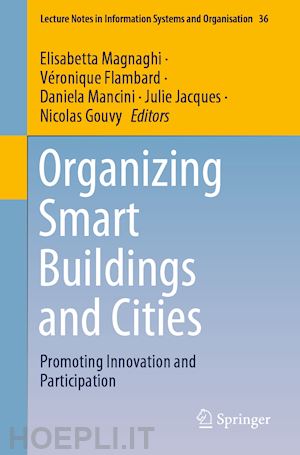
Questo prodotto usufruisce delle SPEDIZIONI GRATIS
selezionando l'opzione Corriere Veloce in fase di ordine.
Pagabile anche con Carta della cultura giovani e del merito, 18App Bonus Cultura e Carta del Docente
The United Nations included sustainable cities and communities in its 2030 SDGs. Cities and, on a smaller scale, neighborhoods, building managers and firms are now adopting technologies and information systems to help achieve the energy, economic, social and environmental transition. This volume gathers contributions on the key organizational success factors for this transition.
To do so, it analyzes the role of information systems, use of data, and technological assistance solutions from multiple perspectives. The goal is to develop a framework that can successfully apply information systems to organizational and environmental issues for smart cities and smart buildings. Accordingly, the book addresses living-lab experiment evaluation techniques, and provides critical analyses of the role of the environment, context and users’ behavioral responses. In addition, it discusses key questions on the efficient management of resources, need for appropriate IT solutions, and employing co-creation with users to improve planning and organization.
Organizational and Environmental Framework of Smart Cities, Universities and Buildings.- Smart Cities: a response to wicked problems.- Big Data: an introduction to data-driven decision making.- Best practices and strategies in sustainability and smart mobility: student engagement in Italian universities.- Digital Humanities and Smart City. University as a Service and Uni-Living Lab for the City: Thinking the Case of La Rochelle Thanks to Social Sciences and Humanities.- Smart city in China: the state of art of Xiong an new area.- Medium-sized Smart cities: a smart vision for urban centralities and buildings. From the European case history, to a proposal for the city of Parma, Italy.- What is an intelligent building?.- Encouraging energy efficiency among residents of smart and green buildings.- The obstacles of circular economy in the real estate sector.- Transforming the Catholic University of Lille Campus into a Smart Grid.











Il sito utilizza cookie ed altri strumenti di tracciamento che raccolgono informazioni dal dispositivo dell’utente. Oltre ai cookie tecnici ed analitici aggregati, strettamente necessari per il funzionamento di questo sito web, previo consenso dell’utente possono essere installati cookie di profilazione e marketing e cookie dei social media. Cliccando su “Accetto tutti i cookie” saranno attivate tutte le categorie di cookie. Per accettare solo deterninate categorie di cookie, cliccare invece su “Impostazioni cookie”. Chiudendo il banner o continuando a navigare saranno installati solo cookie tecnici. Per maggiori dettagli, consultare la Cookie Policy.